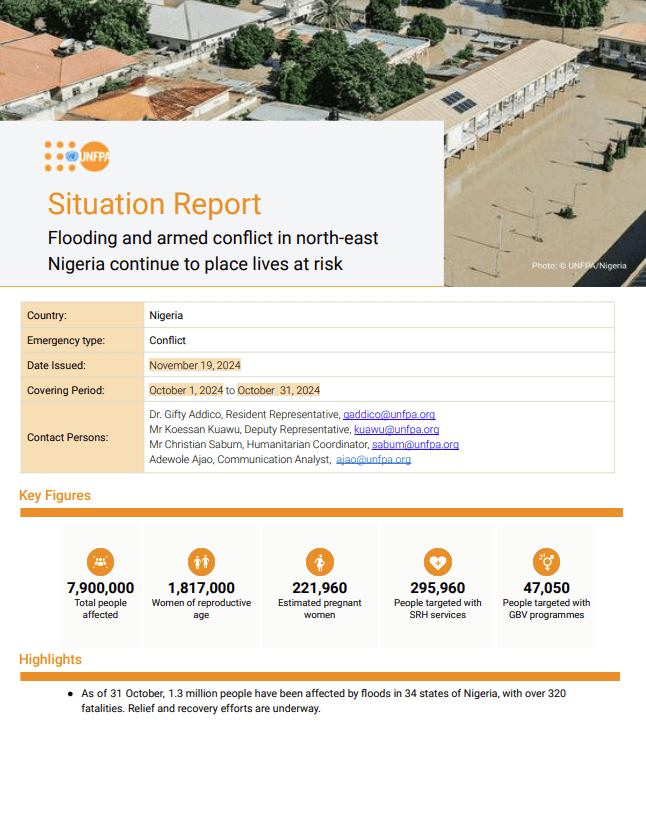
Resources
Nigeria Situation Report #2 - November 2024
Resource date: Nov 2024
Author: UNFPA Nigeria

Resources
Resource date: Nov 2024
Author: UNFPA Nigeria
As of 31 October, devastating floods across 34 states in Nigeria have affected 1.3 million people and claimed over 320 lives. The destruction has severely disrupted essential services, particularly health care, including sexual and reproductive health (SRH). In Maiduguri, Jere, and Konduga Local Government Areas, 25 primary health care centres and two tertiary facilities have been destroyed. The Niger and Benue rivers in Lokoja, Kogi State, and Makurdi, Benue State, have reached critical red-alert levels, placing more areas at risk of further flooding. In Borno State, escalating violence has deepened food insecurity, forcing women and girls to adopt negative coping mechanisms. The floods have also worsened malnutrition across Borno, Adamawa, and Yobe (BAY) states, while cholera outbreaks were declared in Adamawa and Yobe in late September and in Borno on 4 October.
In response, UNFPA has partnered with the Gender-Based Violence Area of Responsibility and other organizations to deliver critical interventions. So far, 17,223 individuals have accessed SRH services through UNFPA-supported facilities, including clinical management of rape, antenatal and postnatal care, skilled birth attendance, HIV and STI testing and treatment, and family planning. Additionally, 8,341 individuals have received protection and gender-based violence services, such as case management, mental health and psychosocial support, temporary safe shelter, psychosocial first aid, security and legal assistance, and specialized referrals. To bolster health systems, UNFPA has distributed 72 Inter-Agency Reproductive Health kits to facilities in BAY states, providing essential medicines and supplies for safe births, obstetric emergencies, and clinical care for survivors of sexual violence.
Despite these efforts, the funding shortfall is critical. UNFPA Nigeria requires US$ 20.9 million to support its 2024 Humanitarian Response Plan, but only 31 percent of this amount — US$ 6.7 million from KOICA, Canada, and Norway—has been mobilized. This leaves a funding gap of US$ 14.25 million, jeopardizing the ability to provide life-saving care and protection to women, girls, and vulnerable populations in crisis-affected areas. Urgent funding is needed to meet the growing demands and ensure that no one is left behind.